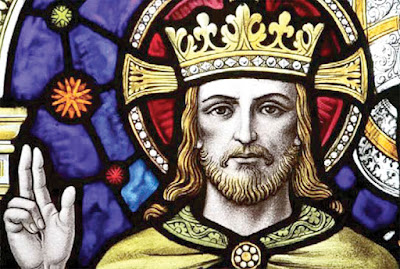First Reading (Joshua 24:1-2A, 15-17, 18B)
Joshua gathered together all the tribes of Israel at Shechem,
summoning their elders, their leaders,
their judges, and their officers.
When they stood in ranks before God,
Joshua addressed all the people:
"If it does not please you to serve the LORD,
decide today whom you will serve,
the gods your fathers served beyond the River
or the gods of the Amorites in whose country you are now dwelling.
As for me and my household, we will serve the LORD."
But the people answered,
"Far be it from us to forsake the LORD
for the service of other gods.
For it was the LORD, our God,
who brought us and our fathers up out of the land of Egypt,
out of a state of slavery.
He performed those great miracles before our very eyes
and protected us along our entire journey
and among the peoples through whom we passed.
Therefore we also will serve the LORD, for he is our God."
Asking the big questions: Is there anything that stuck out to you from this reading? What other "gods" do we sometimes serve? What argument is Joshua trying to make in this reading? What are ways we can serve God?
Responsorial Pslam (Psalm 34:2-3, 16-17, 18-19, 20-21)
R. (9a) Taste and see the goodness of the Lord.
I will bless the LORD at all times;
his praise shall be ever in my mouth.
Let my soul glory in the LORD;
the lowly will hear me and be glad.
R. Taste and see the goodness of the Lord.
The LORD has eyes for the just,
and ears for their cry.
The LORD confronts the evildoers,
to destroy remembrance of them from the earth.
R. Taste and see the goodness of the Lord.
When the just cry out, the LORD hears them,
and from all their distress he rescues them.
The LORD is close to the brokenhearted;
and those who are crushed in spirit he saves.
R. Taste and see the goodness of the Lord.
Many are the troubles of the just one,
but out of them all the LORD delivers him;
he watches over all his bones;
not one of them shall be broken.
R. Taste and see the goodness of the Lord.
Second Reading (Ephesians 5:21-32)
Brothers and sisters:
Be subordinate to one another out of reverence for Christ.
Wives should be subordinate to their husbands as to the Lord.
For the husband is head of his wife
just as Christ is head of the church,
he himself the savior of the body.
As the church is subordinate to Christ,
so wives should be subordinate to their husbands in everything.
Husbands, love your wives,
even as Christ loved the church
and handed himself over for her to sanctify her,
cleansing her by the bath of water with the word,
that he might present to himself the church in splendor,
without spot or wrinkle or any such thing,
that she might be holy and without blemish.
So also husbands should love their wives as their own bodies.
He who loves his wife loves himself.
For no one hates his own flesh
but rather nourishes and cherishes it,
even as Christ does the church,
because we are members of his body.
For this reason a man shall leave his father and his mother
and be joined to his wife,
and the two shall become one flesh.
This is a great mystery,
but I speak in reference to Christ and the church.
Asking the big questions: Is there anything that stuck out to you from this reading? What does it mean to be subordinate to others? What is this reading saying about the relationship between a husband and wife? How is Christ the ultimate bridegroom?
Gospel (John 6:60-69)
Many of Jesus' disciples who were listening said,
"This saying is hard; who can accept it?"
Since Jesus knew that his disciples were murmuring about this,
he said to them, "Does this shock you?
What if you were to see the Son of Man ascending
to where he was before?
It is the spirit that gives life,
while the flesh is of no avail.
The words I have spoken to you are Spirit and life.
But there are some of you who do not believe."
Jesus knew from the beginning the ones who would not believe
and the one who would betray him.
And he said,
"For this reason I have told you that no one can come to me
unless it is granted him by my Father."
As a result of this,
many of his disciples returned to their former way of life
and no longer accompanied him.
Jesus then said to the Twelve, "Do you also want to leave?"
Simon Peter answered him, "Master, to whom shall we go?
You have the words of eternal life.
We have come to believe
and are convinced that you are the Holy One of God."
Asking the big questions: Is there anything that stuck out to you from this Gospel reading? Why would people be shocked at what Jesus has been saying in John 6? Why can we only come to Christ through the Father? Why did so many leave Him?






















